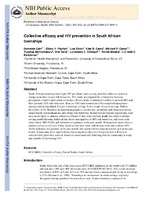Collective efficacy and HIV Prevention in South African Townships
Date
2013Author
Cain, Demetria
Pitpitan, Eileen V.
Mwaba, Kelvin
Eaton, Lisa
Carey, Kate B.
Carey, Michael P.
Mehlomakulu, Vuyelwa
Harel, Ofer
Simbayi, Leickness
Kalichman, Seth C.
Metadata
Show full item recordAbstract
South African townships have high HIV prevalence and a strong need for collective action to
change normative sexual risk behaviors. This study investigated the relationship between
perceptions of individuals about collective efficacy in the community’s ability to prevent HIV and
their personal HIV risk behaviors. Men (n=1581) and women (n=718) completed anonymous
surveys within four Black African Townships in Cape Town, South Africa from June 2008 to
December 2010. Measures included demographics, alcohol use, attitudinal and behavioral norms,
sexual health communications, and sexual risk behaviors. In multivariate logistic regressions, men
were more likely to endorse collective efficacy if they were married, drank less often in alcohol
serving establishments, believed that fewer men approve of HIV risk behaviors, talk more with
others about HIV/AIDS, and had more sex partners in the past month. Women were more likely to
endorse collective efficacy if they drank alcohol less often, talked more with others about HIV/
AIDS, had more sex partners in the past month, but reported fewer unprotected sex acts in the past
month. Community level interventions that strengthen collective efficacy beliefs will have to
consider both protective and risk behaviors associated with believing that the community is ready
and capable of preventing HIV.

